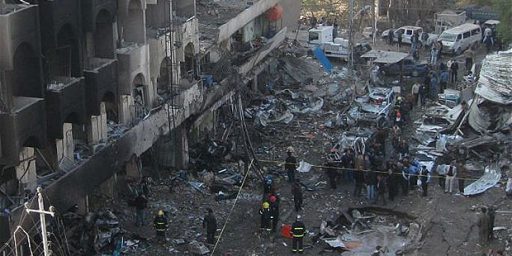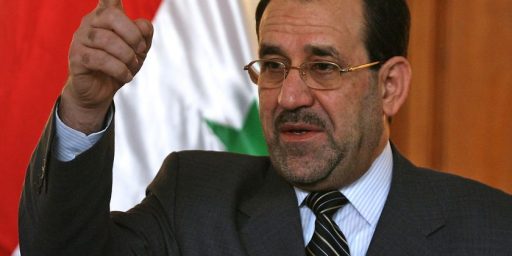Iraq Begins Massive Prisoner Release
Iraq has began what is promised as a release of ten percent of its prison population as a goodwill gesture.
Iraq’s Shiite prime Minister, Nouri al-Maliki made good on a promise Wednesday and released the first 600 of 2,500 detainees he said would be released from some of Iraq’s most notorious prisons. Al-Maliki has made security and reconciliation among feuding Sunni Arab and Shiites a top priority of his new administration.
I must confess, this is one aspect of Arab culture that I simply do not understand. The release of prisoners and captured enemies as a gesture baffles me.
Al-Maliki has announced he wants to take over security from U.S.-led forces within 18 months, starting with four southern provinces by the end of the year. The plan would put American and international forces in a supervisory role, part of an exit strategy that will eventually allow the troops to go home.
Although Iraq may take over security control, it remains doubtful at this point if al-Maliki’s much-touted national unity government will be able to restore order to Baghdad, let alone Iraq as a whole.
One example of Baghdad lawlessness was the random kidnapping of 50 people Monday by masked gunmen wearing police during a bold daylight raid in downtown Baghdad. Police said Wednesday that 15 people had been released, some with signs of torture, but had no other details about their identities. The Iraqi Islamic Party, the largest Sunni Arab contributor to al-Maliki’s coalition government, blamed the Shiite-dominated Interior Ministry for the kidnappings. The ministry, which oversees police, denied its forces were behind the abduction. Suspicion has fallen on militias, which are believed to have infiltrated police forces and have killed hundreds in sectarian violence, personal vendettas and kidnappings for ransom. Al-Maliki has blamed a desire by insurgents to cripple the political process for the spike in violence since he took office just over two weeks ago.
In an apparent effort to appease anger in the Sunni Arab minority over allegations of random detentions and mistreatment of prisoners, 594 detainees were released from U.S. and Iraqi run prisons around Iraq — including Abu Ghraib on the outskirts of Baghdad.
Al-Maliki has stressed that the release plan excludes loyalists of ousted leader Saddam Hussein and his Sunni-dominated Baath Party as well as “terrorists whose hands are stained with the blood of the Iraqi people.” “All the prisoners in the American and the governmental prisons will be released, to give happiness and hope to every detainee and every oppressed person in this country,” said Omar al-Jubori, a member of Iraqi Islamic Party — the largest Sunni Arab grouping the coalition government. He added that prisoners would be released in groups of 500 and that a total of 14,000 would eventually be released. A UN report last month said there were 28,700 detainees in Iraq.
The desire to take over their own security, in relatively short order, strikes me as a hopeful sign. Whether they’ll be able to do it, of course, remains to be seen.






This release of prisoners will only fortify the insurgency’s vallant effort to kick the invader out.
A puppet government sometimes can do good to strengthen the forces that are truly working for a democracy of the people in Iraq;
eventhough they are not pulling the strings.
U.S. OUT.
IRAQI INSURGENCY IN.
(ARE YOU LISTENING MR. GONZALES !)
Compare and contrast the Nouri al-Maliki release of prisoners on entering office with Bill Clinton’s pardons on exiting office. Which is the lesser of two evils?
Well, Clinton let loose a handful of white collar criminals who he owed favors. Unless these people are political prisoners, letting hundreds or even thousands loose strikes me as dangerous.
James,
True, but Al-Maiki is doing this up front when presumably he will face voters in the future. It is unclear from the news article (imagine that, an MSM article that is unclear and leaves out important contextual information) as to when the promise was made. If it was an election promise, then it gets harder to blame him.
Since the numbers are now 2,000 out of 28,700 detainees (apparently AP has issued a correction) this represents less than 10%. Just as Texas found those sorts of prisoners ready for early release when the prisons were crowded (picking those who had served the majority of their sentences and were deemed the least risk), it isn’t inconceivable that they are finding those with the least risk. Like Dukakis, if any of them show up on the police blotter, I suspect that this will be cited in the next election. On the other hand, if releasing
Ever read Thucydides? This has been part of Western culture as well.
Bhoe: Fair point. Still, one can argue that “the West” doesn’t truly exist pre-Reformation and pre-Enlightenment, let alone pre-Christianty.